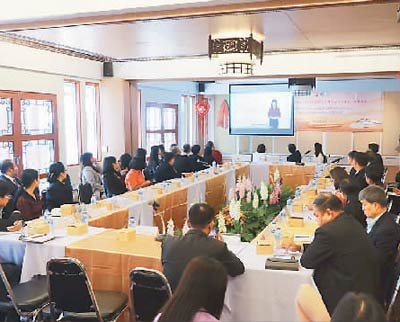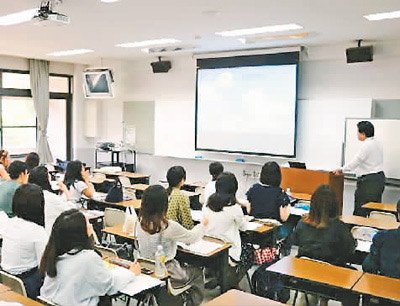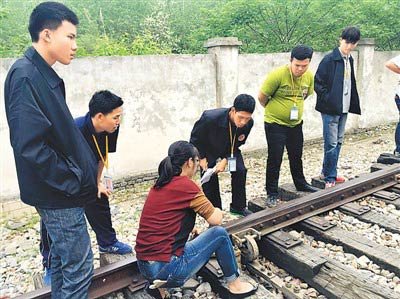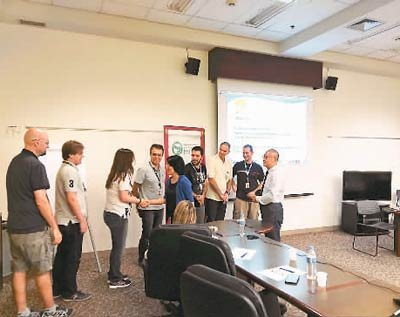"Students will take a one-month-term Chinese language training program at the Confucius Institute at Khon Kaen University first, then a one-year-term relevant vocational training at Wuhan Railway Vocational College of Technology, China, and finally they will return to Thailand to .either obtain employment directly after graduation or continue to study at the Banlat Industrial Community Education College." These are the training procedure for members of the "China-Thailand high-speed rails Chinese language training class".
According to the Hu Lin, Chinese Director of the Confucius Institute at Khon Kaen University, the "China-Thailand high-speed rails Chinese language training class" was launched in 2016 and since then has been held four times, training nearly 200 students. And for the first three times, altogether 135 students were sent to China to study railway-related majors and came back to their homeland after graduation and now have become Thailand’s first batch of well-rounded talents who are proficient in Chinese as well as advanced technologies such as railway machinery and signaling. "Quite a few students in this project are playing an active role in railway-related positions."
As a unique project of "Chinese +" project, the "China-Thailand high-speed rails Chinese language training class" is regarded as an excellent example of "Chinese + Vocational Skills" mode for talent cultivation.
Demands Give Rise to "Chinese +" Program
Behind the "China-Thailand high-speed rails Chinese language training class" lies the increasing demand of Thailand for talents who understand both railway technologies and Chinese as "the China-Thailand Railway Cooperation" progresses.
In August, 2019, the Confucius Institute at Khon Kaen University introducing online courses on vocational Chinese to presidents of vocational colleges in Thailand. Photo by the Confucius Institute at Khon Kaen University
Hu Lin still remembers the first time when this project welcomed its first batch of students back in 2016. "Twenty-three students didn’t know Chinese at all then, but after one month of training at the Institute, they were able to have basic communication in Chinese. After sending students to vocational colleges in China for training, we realized one problem — students had difficulty in their vocational studies due to their limited Chinese proficiency, and because of domestic vocational colleges’ lack of Chinese-teaching experience, the two sides encountered obstacles in work docking." Against this backdrop, the Confucius Institute at Khon Kaen University began to adjust its ways of teaching and to better the teaching of railway vocational Chinese.
Except for the first batch of 23 students, the number of students in each "China-Thailand high-speed rails Chinese language training class" was limited to 40 to 50. "We were not in a hurry to expand the enrollment; instead we focused on the quality control. We’ve gained much teaching experience after four times of running the project. And now the students sent to China for vocational training have made much progress in their Chinese," said Hu Lin.
Some experts suggested that, with the deepening docking of the "Thailand 4.0", the Eastern Economic Corridor and the Belt and Road Initiative, more and more vocational technology colleges in Thailand are expecting greater cooperation with China.
The demands for "Chinese +" all-rounded talents are not limited to Thailand. Considering the demands of the market, industries and commerce for professional talents, the Science and Technology Confucius Institute at Belarusian National Technical University has been committed to cultivating scientific and technical manpower that understands Chinese and has made plans to cultivate relevant talents; and in order to deepen the docking of Belt and Road Initiative and Egypt's "Vision 2030", the Confucius Institute at Suez Canal University, Ismailia, Egypt has helped the Suez Canal University to establish the Egyptian Chinese College for Applied Technology, marking the first time that China and Egypt has carried out cooperation on education of vocational technology by means of co-running institutes at the international level; and with the aim of meeting students’ requirements, the Confucius Institute at Catholic University of the Sacred Heart or Catholic University of Milan cooperate with the department of law at Catholic University of the Sacred Heart or Catholic University of Milan and they provide courses on "Chinese Business Laws" each term, teaching students of the department of law and department of foreign languages as well as lawyers.
Active Attempts in the Diversity of Chinese Teaching
Transferring unitary Chinese language teaching to the teaching mode of "Chinese +" is an active attempt Confucius Institutes have made in the field of diversity of Chinese teaching and is also a prerequisite for Chinese teaching to better serve the development of local social development. The "Chinese +" project has involved quite a few Confucius Institutes in its path to development.
Since 2017, the Confucius Institute at Kansai Gaidai has been offering the course on "Chinese for Flight Attendants", aiming at students at Kansai Gaidai University who have already passed the HSK 4 and higher-level HSK tests and who plan to hunt for jobs in the aviation field. The pilot course has only 30 places for students each term which are snapped up quickly. Statistics show that as of the fall term in 2019, the course has been held for three years or six semesters in a row, and the number of classes has increased to two, with 180 students. At the same time, the Institute has further combined Chinese teaching with employment, adding characteristic courses such as commerce Chinese, medical Chinese and international career planning.
Since 2017, the Confucius Institute at Kansai Gaidai has been offering the course on "Chinese for Flight Attendants". Photo by the Confucius Institute at Kansai Gaidai
The course on "Chinese + Information Education on Vocational Technology" aims to cultivate hands-on vocational technical personnel in the information field for domestic production enterprises and Chinese-funded enterprises, targeting undergraduates at the Egyptian Chinese College of Applied Technology at the Suez Canal University. With this mode, the Confucius Institute is responsible for Chinese teaching and its Chinese partner Beijing Information Technology College deals with the teaching of professional vocational knowledge.
According to Chinese Director of the Maritime Silk Road Confucius Institute, the Maritime Silk Road Confucius Institute cooperates with the Office of Vocational Education Committee (OVEC) in Thailand, cultivating talents of "Chinese + Skills", "Chinese + High Speed Railway", "Chinese + Aviation Flights" and so on. "And the Institute also cooperates with the world’s first Luban Workshop, co-cultivating ‘Chinese +’ talents."
Relevant statistics show that, more than 100 Confucius Institutes in over 40 countries such as Thailand, Malaysia, Tanzania and Ethiopia offer "Chinese +" courses, concerning more than ten fields such as high-speed railway, commerce, tourism, law, customs and aviation.
From on-the-spot Teaching to Online Courses
The 2019 International Chinese Language Education Conference held the forum on "Chinese + Vocational Skills" for the first time, inviting enterprises and education professionals at home and abroad to have discussions on the topics such as how to realize the docking of employment and entrepreneurship and how to maintain the sustainable development of "Chinese +" project.
Ato Habtewold Hailu, Vice President of Technical, Vocational Education and Training Institute of Ethiopia said that, the Confucius Institutes should strengthen its cooperation with enterprises, higher vocational colleges and more companies to share resources and tackle with problems in aspects concerning teachers, teaching materials, course promotion and so on.
As a matter of fact, many Confucius Institutes has begun their exploration on sustainable development of "Chinese +" project and research and development as well as online courses have been one channel.
The "China-Thailand high-speed rails Chinese language training class" was launched in 2016 and since then has been held four times, training nearly 200 students. First batch of students receiving training in Wuhan. Photo by the Confucius Institute at Khon Kaen University
For students at the Confucius Institute at Khon Kaen University, here is a piece good news — the online Chinese courses designed by the Confucius Institute will be available soon, with the first round of tests covering fours subjects — Chinese, logistics and e-commerce, information technology and mechatronics. Hu Lin said that, "usually we offer face-to-face teaching, but with limitations, for Confucius Institute teachers are expert at language teaching, but they would encounter challenges when it comes to vocational knowledge. As a result, we cooperate with domestic vocational colleges to design online courses on vocational Chinese, transferring the process of "basic Chinese — vocational learning" to a process of "basic Chinese —preparation teaching of vocational language — vocational learning."
The representatives of the China from the Business Confucius Institute at FAAP in Brazil meeting the local business representatives Photo by the Business Confucius Institute at FAAP in Brazil
The Business Confucius Institute at FAAP in Brazil also designed the online course on Business Chinese. "Our principle is to collect possible situations that may happen when doing business in China and put them into our textbooks, enabling students to master basic vocabulary and sentences on Business Chinese, which helps to meet the demand for basic communication." The Chinese director Zhu Xiaoshu added, "the FAAP course on Business Chinese is scheduled to finish six levels. Each level lasts for 13 weeks, altogether 60 hours. For now, the online course has completed two levels and its third level is underway, with the first-level course now officially available and has enrolled its first batch of students." (cited from Confucius Institute Headquarters, source: People’s Daily Overseas Edition, Story by Zhao Xiaoxia)






